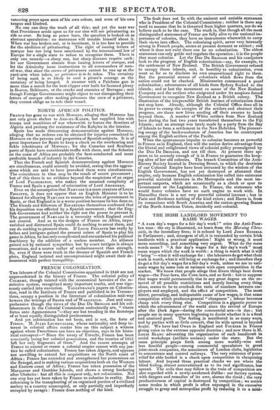FRENCH COLONIZATION.
Tim labours of the Colonial Commission appointed in 1840 are not unprecedented in the history of France. The colonial policy of COLBERT, though tainted with the economical heresies of the re- strictive system, recognized many important truths, and was vigo- rously carried into execution. Tar.LeritAND's papers on Coloniza- tion, read in the Institute of France and published in its Transac- tions, occupy a position in the literature of colonization mid-way beween the writings of Sutra and of WAKEFIELD. Just and com- prehensive though the views of the Due DE BROGLIE and his col- laborateurs in the Colonial Commission undoubtedly are, " vixere fortes ante Agamemnona "—they are but treading in the footsteps of at least equally distinguished predecessors. And yet colonization has not been, and is not, the forte of France. M. JULES LECHEVALIER, whose nationality and deep in- terest in colonial affairs render him on this subject a witness against whom Frenchmen can have no objection, says in his histo- rical retrospect—" Since the treaty of Utrecht, France has been constantly losing her colonial possessions, and the treaties of 1815 left her only fragments of them." And the recent attempts of France to extend or create a colonial empire cannot with any jus- tice be called colonization. France has taken Algeria, and appears not unwilling to extend her acquisitions on the North coast of Africa ; France has extended and strengthened her possessions on the Senegal, and is making various acquisitions both on the Western and Eastern coast of Africa ; France has taken possession of the Marquesas and Gambier Islands, and shows a strong hankering after Otaheite : but all this is conquest only, not colonization. Not one step has yet been taken by France to colonize in reality. Real colonizing is the transplanting of an organized portion of a civilized society to a country unoccupied, or only partially and imperfectly occupied by savages : France does nothing of the kind. 1 The fault does not lie with the eminent and amiable statesman who is President of the Colonial Commission ; neither is there any need to assume that he is thwarted from higher quarters, nor do we believe such to be the case. The truth is, that though all the most distinguished statesmen of France are fully alive to the national im- portance of colonies, they have no instruments wherewith to carry their views into effect. The colonizing spirit, never very intensely strong in French people, seems at present dormant or extinct ; and where it does not exist there can be no colonization. The ablest statesmen can only guide and regulate the operation ; it is the people that must colonize. Let the Duc DE BROGUE and his coadjutors look to the progress of English colonization—say, for example, to the settlement of New Zealand. The British Government refused to occupy those islands, and, in hostility to colonization, even went so far as to disclaim its own unquestioned right to them. But the perennial stream of colonizers which flows from the nation could not be checked. Missionaries commenced a quasi colonization ; adventurers of all kinds from Sydney flocked to the islands ; and at last the movement en masse of the New Zealand Company and the settlers who emigrated under its auspices forced Government to recognize New Zealand as a British colony. The illustration of the irrepressible British instinct of colonization does not stop here. Already, although the Colonial Office does all in its power to cramp the energies of the settlers and obstruct their progress, are these new hives sending off their swarms to lands beyond them. A number of White settlers from New Zealand have during the last two years transferred themselves to the Fiji Islands ; and an attempt was lately made by a party from the Bay of Islands to form a settlement in the New Hebrides. The pioneer- ing energy of the backwoodsmen of America has its counterpart among the English settlers of the Pacific. When the spontaneous impulse to colonize becomes as powerful in France as in England, then will the nation derive advantage from the liberal and enlightened views of colonial policy promulgated by the Due DE BROGUE, and not till then. At present there ap- pears to be scarcely enough of it in France to guarantee the keep- ing alive of her old colonies. The branch Committee of the Anti- Slavery Society located in Downing Street, to which the destinies of our Colonial Empire have been intrusted by the wisdom of the English Government, has not yet destroyed or alienated that empire, only because English colonization has called into existence powerful material interests in the Metropolis and the most im- portant outports, which act occasionally as a check or spur to Government or the Legislature. In France, the statesmen who would foster colonies have no such engine to work with. In Marseilles there is a not very powerful colonial interest ; but in Paris and Bordeaux nothing of the kind exists ; and Havre is, from its connexions with South America and the cotton-growing States of the North American Union, decidedly anti-colonial.


























 Previous page
Previous page